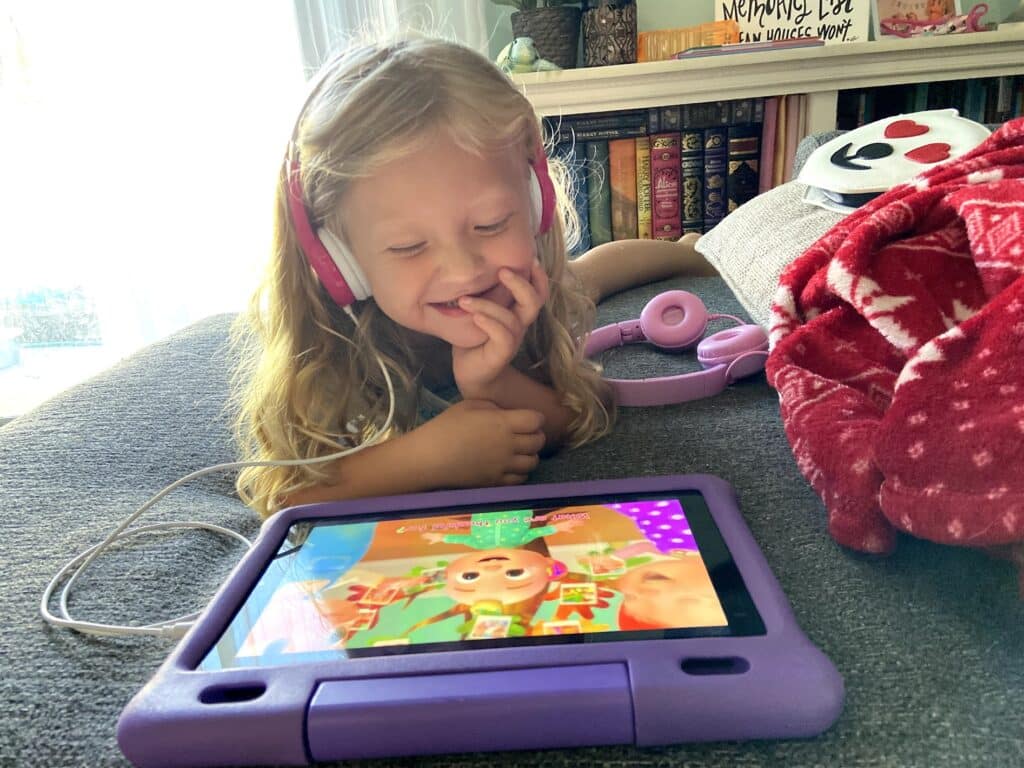Managing Screen Time for Kids: Expert Tips for Parents
Excessive screen time has become a common concern for parents in the digital age. With children spending more time on screens than ever before, it’s important for parents to be aware of the potential negative effects and take steps to manage their child’s screen time. These tips for managing screen time for kids can help your family thrive in this digital age.
The American Academy of Pediatrics recommends that children aged 2-5 should have no more than one hour of screen time per day, while children aged 6 and above should have consistent limits on the amount of screen time they have each day.
As a mom of four little girls, there are definitely days when we exceed these limits for screen time, especially when we are traveling or my girls are out of school.
Managing screen time can be challenging, but it’s an important step in promoting healthy habits and reducing the negative effects of excessive screen time. Setting clear rules and boundaries around screen time can help children develop healthy habits and reduce the risk of negative effects such as obesity, poor sleep, and behavioral problems. By creating a balance between screen time and other activities such as outdoor play, reading, and socializing, parents can help their children develop a healthy relationship with technology.

Why Managing Screen Time is Important
Excessive screen time can have negative effects on children’s health, well-being, and development. Here are some reasons why managing screen time is important:
Health Risks
Spending too much time in front of screens can lead to health problems such as obesity, eye strain, and headaches. It can also affect children’s posture and lead to back and neck pain.
Sleep Disturbances
Using screens before bedtime can interfere with children’s sleep patterns, making it harder for them to fall asleep and stay asleep. This can lead to fatigue and difficulty concentrating during the day.
Relationship Issues
Spending too much time on screens can lead to social isolation, which can affect children’s relationships with their peers and family members. It can also interfere with their ability to communicate effectively and develop social skills.
Depression and Anxiety
Research has shown that excessive screen time can be linked to depression and anxiety in children. This may be due to the social isolation and lack of physical activity associated with screen time.
Lack of Physical Activity
Spending too much time in front of screens can lead to a sedentary lifestyle, which can have negative effects on children’s physical health. It is important for children to engage in physical activity to maintain a healthy weight and reduce their risk of developing chronic diseases.
Risks of Online Activity
Children who spend a lot of time online are at risk of exposure to inappropriate content, cyberbullying, and online predators. It is important for parents to monitor their children’s online activity and educate them on how to stay safe online.
Managing screen time is important for children’s health, well-being, and development. Parents should set limits on screen time and encourage children to engage in physical activity and social interactions. Following these tips for managing screen time for kids can help.
Guidelines for Managing Screen Time
As technology continues to advance, it becomes increasingly important to manage children’s exposure to screens. The American Academy of Pediatrics recommends that children ages 2 to 5 have no more than one hour of screen time per day, while children ages 6 and older should have consistent limits on the amount of screen time they have each day. Here are some guidelines for managing screen time for kids.
Setting Limits
Parents should set clear limits on screen time for their children. This can be done by setting specific times during the day when screens are allowed, or by setting a limit on the amount of time that can be spent on screens each day. Parents can also use parental controls to limit access to certain apps or websites. I love using the kid profiles on our Amazon Fire Tablets. I am able to set time limits for each of my girls, as well as control what content they can access.
Choosing Quality Programming
When children are allowed screen time, it is important to choose quality programming. Common Sense Media recommends that parents choose educational content that is age-appropriate and engaging for their children. Parents can also use resources like Google Family Link or parental controls on Windows, Xbox, and Android devices to limit access to inappropriate content.
Alternative Activities
It is important to encourage children to engage in alternative activities that do not involve screens. This can include physical activities such as playing outside or participating in sports, creative activities such as drawing or painting, or spending time with friends and family.
Bedtime
Screens should be avoided for at least one hour before bedtime. The blue light emitted by screens can interfere with sleep, making it harder for children to fall asleep and stay asleep. Parents can encourage alternative activities such as reading or listening to music before bedtime.
Household Rules
It is important to establish household rules around screen time. This can include rules around when screens are allowed, where screens can be used, and how much time can be spent on screens. Parents can also encourage family game nights or other activities that involve spending time together without screens.
Using Parental Controls
Parental controls can be a helpful tool for managing screen time. Parents can use these controls to set screen time limits, restrict access to certain apps or websites, and monitor their children’s activity. Many devices, including smartphones and video game consoles, have built-in parental controls that can be customized to fit a family’s needs.
In summary, managing screen time for kids is important for their overall health and well-being. By setting limits, encouraging alternative activities, avoiding screens before bedtime, and establishing household rules, parents can help their children develop healthy habits around screen time.
Tips for Managing Screen Time for Kids of Different Ages

Toddlers
For toddlers, it is recommended that screen time be limited to no more than 1 hour per day. This can include watching educational shows or playing interactive games with parental supervision. It is important to choose age-appropriate content and to avoid exposure to violent or inappropriate material.
Children
For children aged 6-12, screen time should be limited to no more than 2 hours per day. It is important to encourage a balance between screen time and physical activity, as well as social interaction with peers. Parents should also consider setting guidelines for when and where screens can be used, such as no screens during mealtimes or before bedtime.
If introducing your kids to messaging during this age range, I highly recommend Messenger Kids through Facebook. This app allows your kid to chat with friends (with adult approval) and is completely transparent in allowing parents to view exactly what their kid is saying and doing.
Teens
For teenagers, it can be more challenging to manage screen time as they become more independent. However, it is still important to set limits and establish guidelines. Encourage teens to take breaks from screens and engage in other activities, such as hobbies or spending time with friends. It is also important to monitor their online activity and have open communication about internet safety and responsible use of technology.
Overall, managing screen time for kids requires a balance between allowing them to enjoy technology while also promoting healthy habits and limiting exposure to inappropriate content. By setting guidelines and encouraging a balance between screen time and other activities, parents can help their children develop healthy habits that will benefit them in the long term.

The Role of Parents in Managing Screen Time
Parents play a crucial role in managing their children’s screen time. They are responsible for setting expectations, providing guidance, and enforcing rules. Here are a few tips for managing screen time for kids for parents:
Set Household Rules
Establishing clear household rules around screen time is important. Parents should set limits on the amount of time their children can spend on devices and social media platforms. They should also set guidelines around when and where devices can be used.
Be a Role Model
Children often mimic their parents’ behavior. Parents should be mindful of their own screen time and set a good example for their children. They should limit their own screen time and spend more time engaging with their children.
Use common sense media
Parents should use resources like Common Sense Media to help them make informed decisions about what their children are watching and playing. This website provides reviews and ratings for movies, TV shows, video games, and more.
Encourage physical activity
Parents should encourage their children to engage in physical activity and limit sedentary screen time. They can encourage activities like sports, outdoor play, and family walks.
Monitor Device Usage
Parents should monitor their children’s device usage and be aware of the apps and websites they are using. They can use parental control apps to limit access to certain apps and websites and monitor their children’s device usage.
Spend Time Together
Spending quality time with children is important. Parents should make an effort to engage in activities with their children that do not involve screens. This can include outdoor activities, reading books, playing board games, or simply having a conversation.
Encourage Positive Social Media Use
Social media can have a negative impact on children’s mental health and well-being. Parents should encourage their children to use social media in a positive way and teach them how to navigate online spaces safely.
In summary, parents have a crucial role in managing their children’s screen time. By following these tips, parents can help their children develop healthy screen time habits and avoid the negative effects of excessive screen time.









